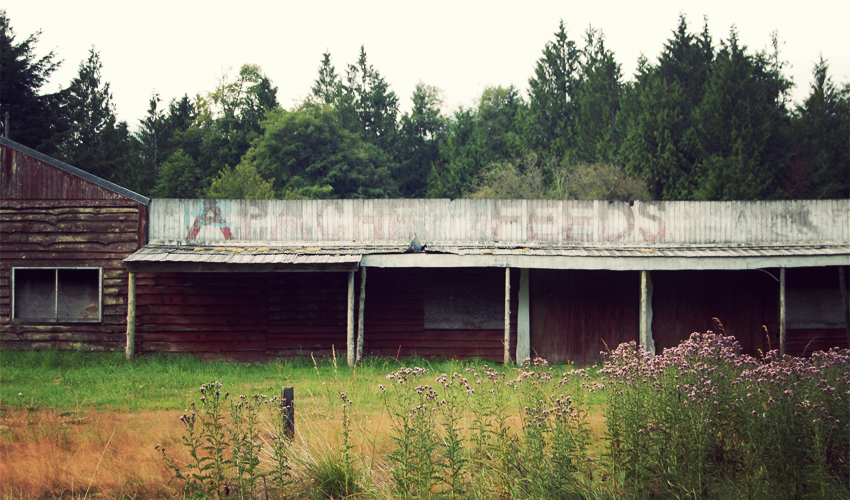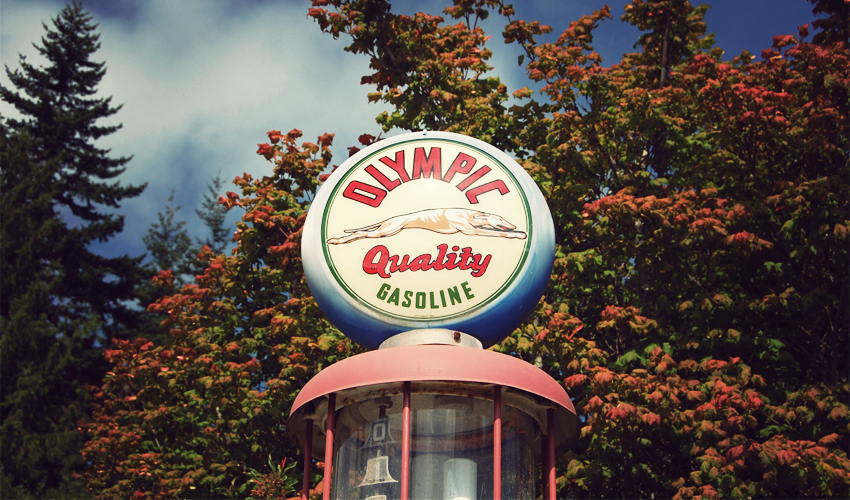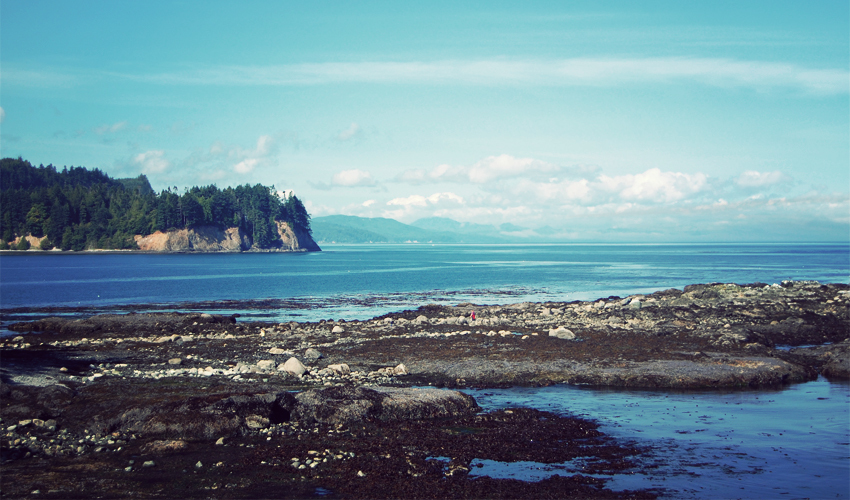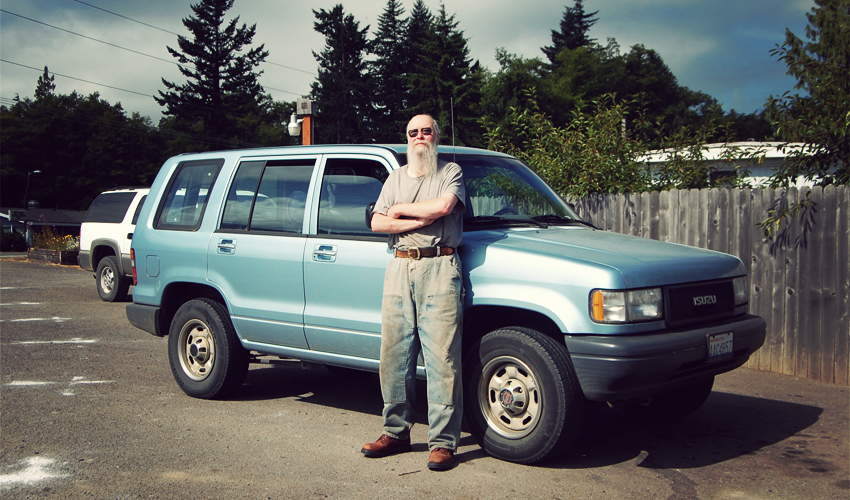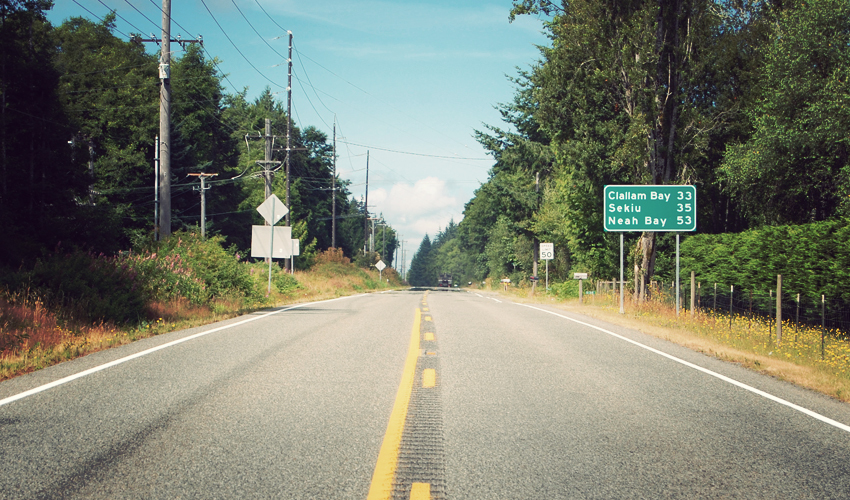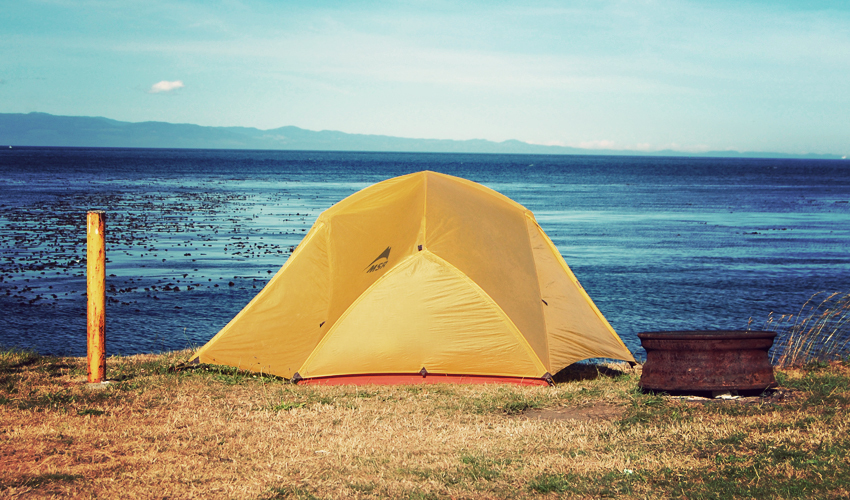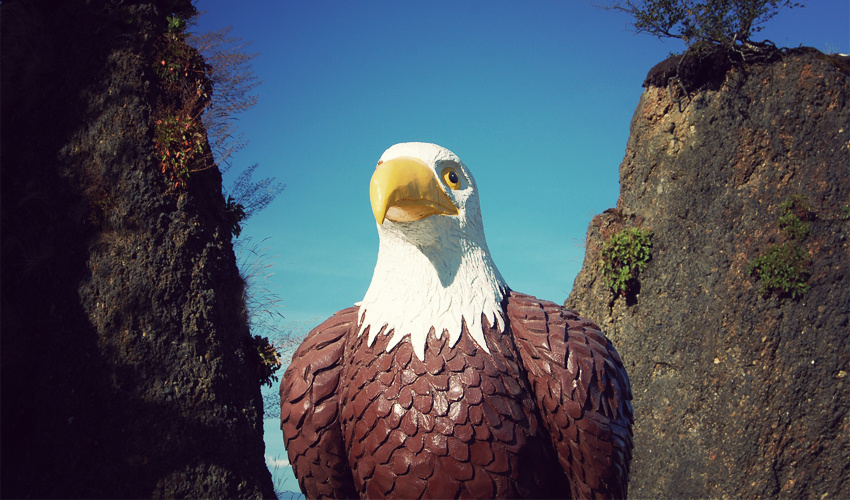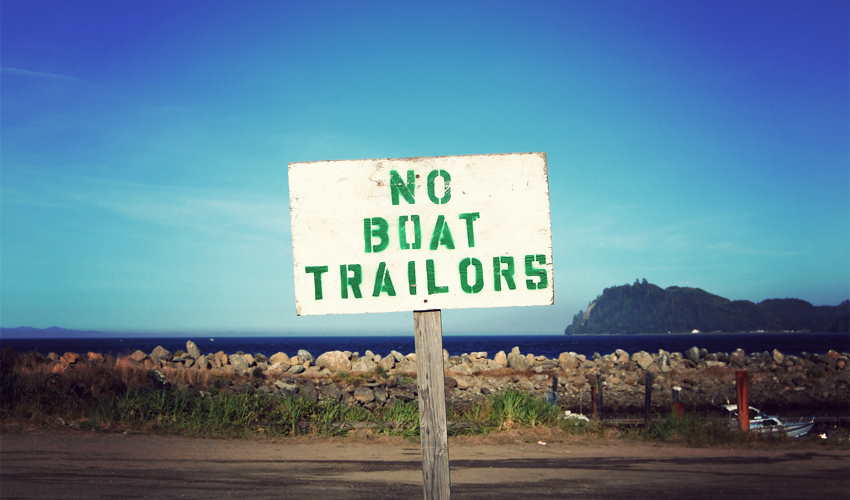August 15, 2011
Day 125: Near Port Angeles, WA to Sekiu, WA
I went to bed expecting to wake up to gray skies, rain drops popping off the tent fly, and a cold and steady wind from the west. Instead I get sunshine, no breeze at all, and only a few bits of cloud that hang on to the tops of the rolling hills that rise up to the south. It's an incredible morning on its own merits, but the fact that it's unexpected helps push me toward the coast with a warm feeling in my soul.

| Heart | 0 | Comment | 0 | Link |
Ten miles down the road I stop in the tiny town of Joyce, at the building that houses its gas station, its general store, and its post office. As I try to figure out the best way to cram two Milky Way bars, a tiny can of Pringles, and a 20-ounce Mountain Dew into mostly full panniers, I fall into conversation with an older guy named Michael. He's at the same time big and small—tall, with very long legs and broad shoulders, but thin through the middle, such that his gray t-shirt and dirty blue jeans both hang loosely. He wears dark-tinted glasses and has thin white hair on the top of his head, but both features are overshadowed by the wispy beard that stretches almost a foot from the bottom to where the top starts above his lips.
"Ya got a lotta gear there," he says. "How much do ya figure all of that weighs?"
I tell him that the bike's 35 pounds and the gear comes in somewhere around 40.
"Where ya headed with all of it?"
"Neah Bay. I've been riding for four months, from Key West. One more day and I'll be there."
"Did ya get a chance to stay at the park down at Salt Creek?"
"No, I didn't. I wanted to, but I didn't get far enough last night and I want to make it to Clallam Bay today."
"Oh man," he says, his voice turning a notch higher. "It's one of the most beautiful places there is. Ya gotta see it. I'll take ya down there if ya want. It won't take but half an hour."
While I lock up my bike, Michael loads two 18-packs of beer—one Icehouse, one Miller High Life—into the back of his blue Isuzu Trooper. And then we're off, slowly winding our way down toward the water, through the shade cast by giant cedar trees older than any living person. Michael tells me that 30 years ago he took a road trip that started in Minnesota, went to Bangor, Maine, continued on down to Key West, and then stretched to Galveston, Texas and San Diego before reaching the area of the Northwest where we now drive. He knew he'd found the right place as soon as he got here. He fell in love with it and he's lived in the area ever since. He now has a home 15 miles back toward Port Angeles, on 50 acres of land packed tight with old-growth timber. For many years he drove a county bus, but now he's retired and spends his time working around his property, kayaking and canoeing on the Strait and the nearby lakes and rivers, and exploring the area's beaches. He used to be married, but his wife of 30 years left him a couple of years ago. He talks of her with a mix of sadness and longing.
Within a few minutes the road drops us down to a sweeping bay wedged between two rocky points, where the salt water rolls quietly in and spreads out on a broad and flat beach covered with grayish-brown sand and dotted with small rocks and shells. Out to the north, Vancouver Island is nowhere to be found, socked in behind a thick bank of white fog. Not much farther on we reach the county park near Salt Creek. Michael parks the SUV near the start of a walkway that leads to a bluff overlooking the Strait. To get there we head past the remnants of a bunker that the military occupied as recently as the 1950s, where large-caliber guns were mounted to protect the Puget Sound from invading ships.
"This is the place," he tells me with excitement. "This is where I want my ashes spread. Isn't it just the most amazing place you've ever seen?"
It's stunning, especially on such a beautiful morning, with the rocky cliffs to the west glowing in the sun, the water rolling gently, the thousands of strands of kelp washing up against the shore, and a view that stretches 25 miles to both the west and the east.
His reaction is just as wonderful. There isn't a person in this world who will ever love this spot as much as he does.
Unfortunately the park also churns up sad memories for Michael. He points out the campsite where he lived in his SUV for two weeks when he and his wife were going through rough times. He tells me how she always loved the city, but that he much prefers the country life.
"She was a real social butterfly, ya know?" he says. "She probably has 500 friends. I maybe have five."
He also battled issues with his extended family for years.
"They always hated me," he says. "They felt like I stole her away and moved her as far away from them as I could."
On the walk back to the car he stops, fishes through his wallet, and pulls out the small picture of her he still carries. She's beautiful, with long strawberry blonde hair and a wide, perfect smile. All of a sudden the stories and the heartache seem so much more real.
As the half hour trip turns into an hour, it becomes clear that Michael is trying but not necessarily succeeding to come to grips with the fact that the woman he loved more than anything in the world for 30 years could only be happy if he was no longer a central part of her life. He's trying to get by as best he can, but the pain and sadness that surround his heart come through so clearly as he tells stories that always wind their way back to her. The scars also show up physically; his belt now sits five notches farther in than it did when they were together. He says that they still see each other occasionally at social events. I wonder if that makes things better, or instead serves as a regular reminder of everything that he lost.
I look out the window of the Trooper at the water and the rocks and the fog and try to take in the beauty and power of it all. But at the same time I can't help but think about how I'd feel if 25 years from now Desiree told me that she was packing up and leaving and didn't much care if she ever saw me again.
When I consider it that way, I realize that Michael's keeping his life together just about as well as he could.
Back at the store in Joyce I thank him for taking the time to show me around a small corner of one of the most far-flung parts of America.
"No, thank you," he says. "I always like showing people around, letting them in on things they'd pass by or wouldn't see otherwise."
Having someone to listen and talk with for an hour doesn't seem to have been a bad thing, either.
As I ride away I think about how, after tomorrow, there won't be any more car rides with strangers, or roadside confessionals that brings me into the world of someone I've never met before and will never see again. I decide that they are the things I will miss most of all.
Logging trucks are the biggest and fastest things on Highway 112. They fly around corners, scream down the straight stretches, and treat the center line as a suggestion. They're the coal trucks of Washington State. Luckily I can almost always hear them coming, either from the loud chattering of their jake brakes or the groaning of their huge diesel engines as they struggle to pull two trailers loaded full with freshly chopped logs. When I'm not looking out for 18 wheels of death in the rearview mirror I watch shadows drift across the narrow two-lane highway as low clouds pass a few hundred feet above. The early afternoon sends me up and down over and over again, through large plantations of young trees that replaced the old-growth forest that was ripped away 30 or 40 years ago.
The wind kicks up cold and strong as I drop down to the town of Clallam Bay, which sits at the southeast corner of the bay of the same name. Even though it's the middle of the summer and the sun shines brightly, every hair on my body stands on end and my nuts take shelter next to my stomach on the mile-and-a-half ride along the edge of the water that takes me to Sekiu.
I set up the tent and for the last time screw with the poles that have been broken since North Carolina. The grassy spot where it sits is less than 20 feet from the bay, much like the first night of the trip where I camped on wooden planks overlooking the Atlantic Ocean in the Florida Keys. But today is so much colder than that night back in April. Even though a large hill stands above Sekiu to the west, wind that holds in the cool of the ocean shoots down through town, rattling the tent fly and bending the poles back and forth before blowing out across the water and kicking up white caps.
Sekiu's all about fishing. It's the kind of place where people find signs that read "Fisherman parking only—all others will be thrown back" hilarious. At the water's edge, seagulls crap all over the rocks of the breakwater. Out to the north, giant cargo and cruise ships pass each other in the Strait. Down in front of me, spread out over a dozen long docks, a hundred boats—none bigger than 30 feet—bob gently up and down. At the nearby boat ramp, old guys wearing blue jeans and heavy jackets talk with reserved excitement about the fish they caught, or try to come up with reasons why they returned to shore with an empty boat. Whatever the outcome, they say things like, "But hey man, that's fishing."
I think about how I'm going to describe it all. And then I realize that after tomorrow almost no one's going to care about how I describe my life, because it's going to be so much less interesting. The mountain passes, strange accents, welcoming strangers, and truckloads of food will be replaced with business meetings, bar trivia, Friday night hockey, and building websites. It's a life I like, and deep down I know I'm ready to return to it, but thinking about it in the moment only brings me down.
As evening turns to night, fog funnels down the Strait, the water starts to reflect blue and purple and orange, and my fingers and toes turn cold and stiff when they aren't covered. The world around me goes on like normal—small waves crash against the rocks just beyond my feet, seagulls cry out, and fishermen bullshit around roaring campfires—but inside the tent I try to prepare myself for something completely unfamiliar. Tomorrow morning, just 24 miles to the west, the long road that started in Florida comes to a cold, wet, sandy end.
Today's ride: 49 miles (79 km)
Total: 6,424 miles (10,338 km)
| Rate this entry's writing | Heart | 3 |
| Comment on this entry | Comment | 0 |
